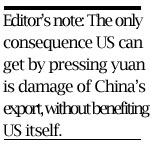Op-Ed Contributors
Toying with yuan won't help US
By Fan Gang (China Daily)
Updated: 2010-03-26 07:51
 |
Large Medium Small |
Fundamental problems in the US economy need to be remedied; potential dangers for both nations loom if renminbi is revaluated
The renminbi exchange rate has once again become a target of the United States Congress. China-bashing, it seems, is back in fashion in the US.
But this latest round of disparagement appears stranger than the last. When the US Congress pressed China for a large currency revaluation in 2004-2005, China's current-account surplus was accelerating. Now China's current-account surplus is shrinking significantly due to the global recession caused by the US financial meltdown.
China's total annual surplus (excluding Hong Kong) now stands at $200 billion, down by roughly one-third from 2008. In GDP terms, it fell even more as GDP grew by 8.7 percent in 2008.
| ||||
Of course, there are now other sources of friction that did not seem as pressing five years ago. The US' internal and external deficits remain large, and its unemployment rate is extremely high. Someone needs to take responsibility, and since US politicians don't want to blame themselves, the best available scapegoat is China and its exchange rate, which has not appreciated against the dollar in 18 months.
But would a revaluation of the renminbi solve the US' problems? Recent evidence suggests that it would not. Between July 2005 and September 2008 (before the bankruptcy of Lehman Brothers), the renminbi appreciated 22 percent against the dollar. Yet the quarterly US current-account deficit increased - from $195 billion to $205 billion.
Most economists agree that the renminbi is probably undervalued. But the extent of misalignment remains an open question. The economist Menzie Chinn, using purchasing power parity (PPP) exchange rates, reckoned the renminbi's undervaluation to be 40 percent. But, after the World Bank revised China's GDP, in terms of PPP, downward by 40 percent, the undervaluation disappeared. Nick Lardy and Morris Goldstein suggest that the renminbi was probably undervalued only by 12-16 percent at the end of 2008. And Yang Yao of Beijing University has put the misalignment at less than 10 percent.

But assume that China does revalue its currency sharply, by, say, 40 percent. If the adjustment came abruptly, Chinese companies would suffer a sudden loss of competitiveness and would no longer be able to export goods. The market vacuum created by the absence of Chinese products could be filled quickly by other low-cost countries, such as Vietnam or India. Companies in the US cannot compete with these countries either. So no new jobs would be added in the US, but the inflation rate would increase.
Now assume that the renminbi appreciates only moderately so that China continues to export to the US at higher prices but lower profits. This would push up inflation rates significantly, forcing the US Federal Reserve to tighten monetary policy and possibly undermining the US' recovery, which still remains shaky. New difficulties in the US and China, the world's two largest economies, would have a negative impact on global investor confidence, hurting US employment even further.
In both scenarios, US employment numbers would not rise and the trade deficit would not diminish. So then what? The historical evidence from the 1970s and 1980s, when the US consistently pressed Japan to revalue the yen, suggests that US politicians would most likely demand that the renminbi appreciate even more.
The exchange rate measures the relationship between at least two currencies, whose values are based on the productivity and domestic balance of their respective national economies. Causes for misalignment may be found on both sides. If the US dollar needs to devalue because of fundamental problems in the US economy, the problems cannot be fixed by lowering the dollar's value alone.
Of course, there are problems with China's external imbalance with the US, such as excessive national savings (which account for 51 percent of China's GDP) and distortions in the prices of energy and other resources. All those problems contribute to the imbalance and China should fix them.
But we should realize that there are fundamental causes for the imbalance on the US side as well, such as over-consumption financed by excessive leverage and high budget deficits. Only when both sides make serious efforts to fix their domestic fundamentals will the imbalances be reduced in a serious and sustained way. Short-run exchange-rate adjustments cannot simply fix negative long-term trends.
China may resume a "managed float" of its exchange rate, particularly if the uncertainty of the overall post-crisis economic situation diminishes. In choosing whether or not to do so, its policymakers may weigh factors ranging from China's international responsibilities to the potential damage of foreign protectionism or even a trade war. What is certain, however, is that China's politicians have a domestic agenda just like the Americans. The key element of that agenda is to maintain employment growth.
One-third of China's labor force remains in agriculture, earning only about half of what migrant workers in China's booming cities make. (Per-capita earnings for China's farmers may rise to $770 if the renminbi appreciates by 10 percent, but of course that is only a US dollar-term revision, with Chinese farmers feeling no increase at all). Getting more farmers into better-paid manufacturing and service-industry jobs will mean not only a reduction in poverty, but lower income disparity. By any moral standard, that goal is at least as important as anything on America's agenda.
The author is professor of economics at Beijing University and the Chinese Academy of Social Sciences, and director of China's National Economic Research Institute.
Project Syndicate, 2010.
(China Daily 03/26/2010 page8)













